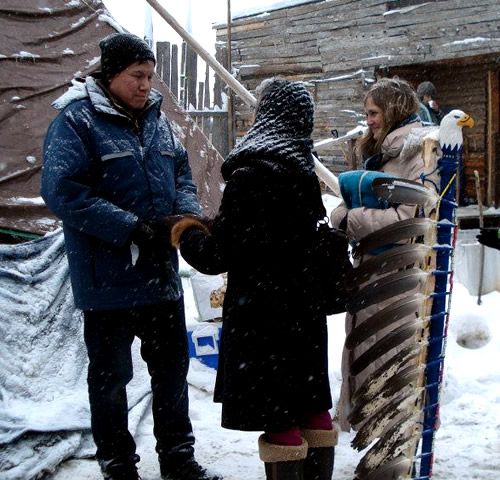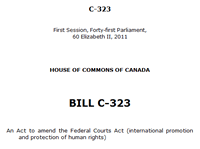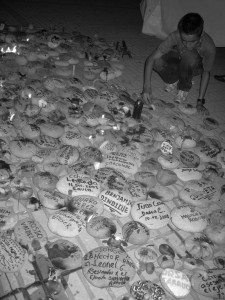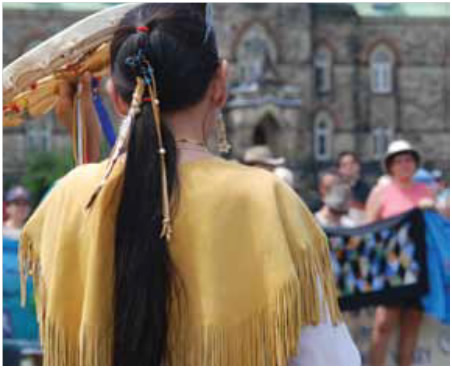 |
||||||||||||||||||||||||||||
January 2013
IN THIS ISSUE
- KAIROS Solidarity with Chief Spence, Idle No More & Indigenous Rights FEATURE RESOURCERemember the Land: Global Ecumenical Voices on Mining FEATURE PARTNERYolanda Becerra:
Popular Feminist Organization (Colombia) REFLECTIONAn Open Letter from Chief Shining Turtle KAIROS Solidarity with Chief Spence,
|
||||||||||||||||||||||||||||
Who is the Government of Canada listening to? |
|
A slew of new legislation that undermines both Indigenous rights and environmental protection in Canada points to the fact that the petroleum and pipeline industries have the power to change the Government of Canada’s legislative agenda, and overrule the Governments constitutional obligations to consult with Aboriginal peoples when their rights are at stake. |
|
Nation to Nation Bike TourWhen: July 27 – August 25 |
|
KAIROS has teamed with the Otesha Project - a youth-led charitable organization that seeks to empower youth to be part of positive social change through cycling tours - to host the Nation to Nation bicycle tour. |
|
The Campaign to Erode Aboriginal and Treaty Rights |
|
"For almost 15 years, the federal Department of Justice has conducted a campaign to erode the constitutional and legal status of Aboriginal and Treaty rights in Canada." So begins a statement signed by over 50 lawyers and academics and almost 2 dozen human rights, First Nations and faith based organisations. |
|
Congolese massacre victims denied justice in Anvil Mining lawsuit |
|
|
|
Colombia can now buy prohibited automatic firearms from Canada |
|
On December 12, the Government of Canada eased its ban on the sale of automatic weapons (banned in Canada) to Colombia, a country that has suffered decades of violent conflict and serious human rights violations. |
|
22nd Annual Women's March for missing and murdered Indigenous women |
|
Their Spirit Lives Within UsOn February 14, KAIROS will join Indigenous and non-Indigenous groups from across Canada in remembering and honouring our missing and murdered sisters in Canada and to demand justice. According to research by the Native Women’s Association of Canada under the Sisters in Spirit initiative, over 600 Indigenous women have been murdered or have gone missing, most over the last 20 years. Many of these crimes and disappearances remain unsolved. |
|
KAIROS 40th Anniversary
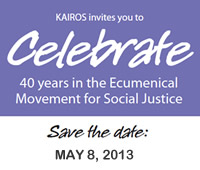
FEATURE RESOURCE
Remember the Land:
Global Ecumenical
Voices on Mining
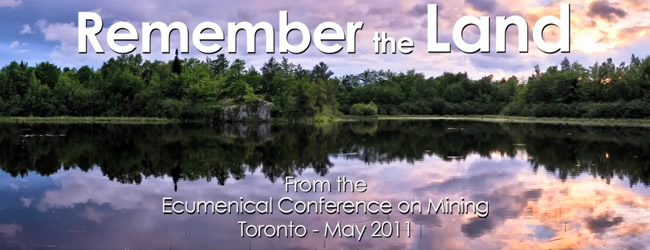
Canada is home to 75% of the world's mining and exploration companies. Canadian stock exchanges raise 40% of all mineral exploration capital worldwide.
In May 2011, 150 people --church leaders and grass roots activists-- from around the world gathered in Toronto to consider the impact of Canadian mining in their communities.
Remember the Land is the story of that gathering -- the story of peoples from the Global South who are engaged in struggles in protect the land that they know and love; the land that sustains them materially, culturally and spiritually; the land that has its own deep, inherent worth.
This 11 minute video features rich theological reflection and offers a number of action opportunities for individuals and churches.
KAIROS has created educational resources to help you use the video in your church or community.
Go to our online store to order a copy of the video with 4 page study guide.
You can also view the video online and download the Study Guide.
If you’d like to go a little further, you can also download the following related resources:
Community Mapping Activity
Find Your Voice: Workshop on Free, Prior, and Informed Consent
If you’re planning a public screening of the video, please use one of our posters:
PDF Fillable Form Poster for Remember the Land
Blank Poster for Remember the Land
As well, be sure to let us know of your event, and we will help publicize it!
Please send event info to Education and Campaigns Coordinator Sara Stratton.
FEATURE PARTNER
Yolanda Becerra
Popular Feminist Organization (OFP)
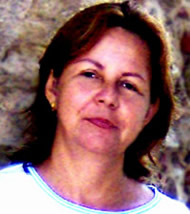
Yolanda is a well known-human rights defender and leader of the grassroots women’s movement in Colombia. She is the national director of the Popular Women’s Organization (OFP), based in Barrancabermeja and a founding member of the social movement of women against the war and for peace in Colombia. KAIROS has been a partner of OFP for over a decade.
Regionally, Yolanda is a member of the network of human rights workers in Magdalena Medio which includes active participation of the diocese, social movements and unions. She is also a member of the regional social forum. Internationally, Yolanda has travelled extensively in Latin America, Europe and North America, bringing concrete testimonies of the impacts of human rights violations and the war on women in Colombia and calling for international solidarity and support. She has participated in meetings of the World March of Women and Women in Black. Yolanda has been recognized nationally and internationally for her courageous work in human rights and as a leader of the women’s movement. Among other awards, she received the prestigious Per Anger human rights prize from Sweden in 2007 and was nominated as one of the 1,000 women to receive the Nobel Peace prize in the campaign One Thousand Women and one Nobel Peace Prize in 2005.
The OFP has been instrumental in setting up recent Women’s Courts for Justice, Territory and Peace. These are symbolic tribunals that are an alternative form of justice that make visible human rights violations against women. In a context where those who commit violence can expect near-total impunity, these courts are a deeply significant forum.
Briefing Papers
Policy Briefing Paper #33 – Signposts for a New Financial Architecture
Policy Briefing Paper #32 – Tax Reform for Equity and Sustainability
Spirited Reflections
To Build and to Plant - a reflection by Rev. Brian McIntosh
Journeys of Light and Shadow – A reflection by Sister Elizabeth Davis
Reflection on an Ecumenical Solidarity Visit to Chief Spence - Jennifer Henry
Two reflections on Idle No More
|
The Idle No More movement has been much in the news, and it has sparked both hopeful reflection and hostile responses. We invite you into some personal or group reflection through two different voices: |
|
An Open Letter to my Non-Aboriginal Neighbours
|
 |
